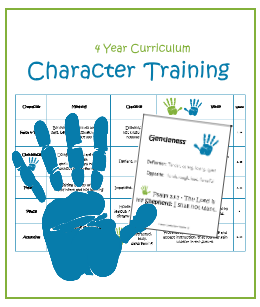
According to the booklet entitled “Making Marriage Last,” problems relating to financial matters are a major reason why marriages break down.1 In my research this was confirmed multiple times. Money is a huge cause of divorce!
Because of this, my husband and I are diligently teaching our children the value of money, giving them a work ethic, and teaching the importance of understanding that any money that comes their way is God’s and they are simply stewards of it.
Here are a few ideas we are doing in our home.

The Value of Money
A few years ago I created a program to teach our children financial wisdom while rewarding positive behavior and providing natural consequences for negative choices. Think of it as a Behavior-Budget-Chores reward program. It presents the kiddos with a chance to learn to tithe, manage spending, and save for larger items.
Read more: Money Management and Behavior System for Preschoolers and Chore and Budget System for Children

Work Ethic
The Bible is filled with stories (i.e. The Parable of the Talents) and verses about money. Many of these also emphasize a solid work ethic and not having a lazy spirit.
Whatever you do, work heartily, as for the Lord and not for men. Colossians 3:23
We are developing a work ethic in our children through chores, teaching the child to take initiative, and in working together as a family. Instead of having everything given to them, our children are understanding what it takes to earn money.
Read more: Are You Giving Your Child the Ultimate Gift? and How to Give Your Child the Gift of Work

Being Wise Stewards
The last avenue we are teaching is that each cent we have is God’s and we are simply stewards to use it for His glory. While living by examples is a wonderful teacher, I believe teaching children to wisely manage money requires conversations about real-life situations for children to understand the “why’s.”
Let me share two recent examples.
Grocery Store Opportunities
While I do most of my grocery shopping through Walmart Pickup (Amazing!), there are times when I take all four kiddos into the grocery store. While everything in me wishes the kids would follow like little ducklings through the aisles without any conversation or hassle, I realize that in rushing through I am missing a God-given, teachable moment.
Let’s say that we are purchasing large marshmallows for our next camping trip. Instead of me grabbing the chosen brand, I ask the kids to figure out which one is best. We talk about price per ounce, quality, and package sizing.
On several occasions, they have asked for snack-sized portions of this or that. Again looking at the price per ounce and package sizing, they quickly see that you would typically pay double for convenience.
While these conversations add to our shopping time, it typically isn’t more than a few minutes and the knowledge gained in unbeatable.
Large Purchases
In the last month, two situations involving ample amounts of money were placed in our laps. Without much warning, we had to decide what to do. Of course, my husband and I talked, prayed, sought wisdom, and researched.
But, we added one more level to our decision making. Our children (ages 6-12). We realized that by involving them in the process, we were providing them with an amazing learning opportunity.
For the last few weeks, we had almost daily family meetings to update the children on the situations.
What we shared:
- Basic information at the initial meeting
- Updates from the last time we discussed
- How we gathered wisdom from others and the research we did
- How the decision involved each child
- How Mommy and Daddy were praying
- How they could pray
For the major meetings, we ended in prayer.
What we didn’t share:
- Detailed information
The conversations were not to burden them but involve them. The time allowed us to explain all of the behind-the-scenes work that we were doing to wisely make our decision and how we were allowing God to guide us. - Dollar amounts
Young children can not grasp large sums of money. They throw around the word “million” in the same manner as “quarter.” So, there was no reason to provide numbers that they could not grasp.
With each of these decisions, I pray God used our conversations as a foundation for monetary wisdom and figuring out God’s will.
Now it’s your turn. How are you training your children to be wise with money?

Character training should be the focus of our parenting. It teaches children the “why’s” instead of “because I said so” thus allowing the child to transfer learning from one situation to another.
Available to order on the ABCJLM website for only $5 as a digital download, the 10-page Character Training printable combines 20 character traits, definitions, opposite meanings, and Bible verses on posters and individual cards. Use with the 4 Year Curriculum, in Teachable Moments, or in character training with children ages 3 to pre-teen.
1 http://www.investopedia.com/articles/pf/07/couples-finance.asp